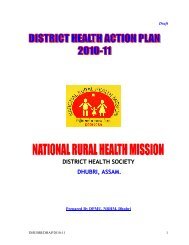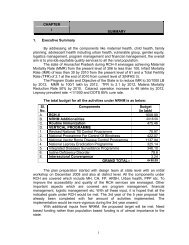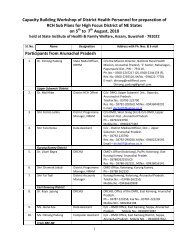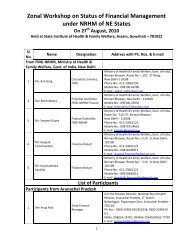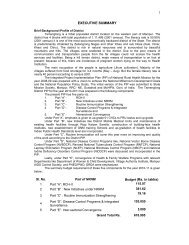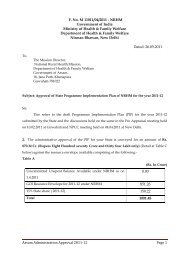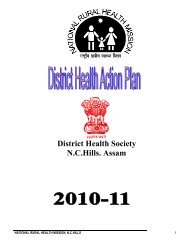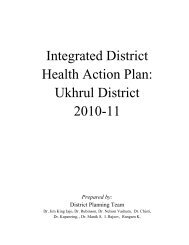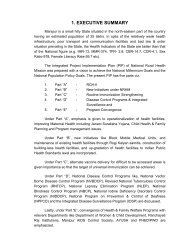- Page 1 and 2: Chapter-I Demographic features: The
- Page 3 and 4: Children under 3 years breastfed wi
- Page 5 and 6: Particulars Mothers registered in t
- Page 7 and 8: DISTRICT INDICATORS ON CHILD HEALTH
- Page 9 and 10: DISTRICT INDICATORS ON FAMILY PLANN
- Page 11 and 12: about 50% of the trainees receive t
- Page 13 and 14: Convergence/ Coordination 3 East ka
- Page 15 and 16: care. This approach is called the I
- Page 17 and 18: The facility survey also indicates
- Page 19 and 20: 21 B.To link with the nutritional d
- Page 21 and 22: Logistics Templates 5 Logistics Ele
- Page 23 and 24: NGOs, CBOs etc Templates 11 Names o
- Page 25 and 26: National Disease program Templates
- Page 27 and 28: For implementation of RCH-programme
- Page 29 and 30: Outcome of B/ L Consultations - Tem
- Page 31 and 32: 3. District level: a. Constitution
- Page 33 and 34: UPPER SIANG 92 92 KURUNG KUMEY 154
- Page 35 and 36: Contraceptive Update DMO, DRCHO, Gy
- Page 37 and 38: 4 NVBDCP 1015.00 5 RNTCP 247.84 6 N
- Page 39 and 40: LIST OF CIVIL WORKS IMPLEMENTED UND
- Page 41 and 42: District Sl. No. Name of work Class
- Page 43 and 44: MINOR CIVIL WORKS SANCTIONED DURING
- Page 45 and 46: MAJOR CIVIL WORKS SANCTIONED DURING
- Page 47 and 48: LIST OF CIVIL WORKS SANCTIONED UNDE
- Page 49: ANM’s quarter Construction of PHC
- Page 53 and 54: Child / Neonatal health PROCESS/ IN
- Page 55 and 56: Institution arrangement and organiz
- Page 57 and 58: Organogram of District Programme Ma
- Page 59 and 60: • Accountability of staff Mission
- Page 61 and 62: ANM/GNM 60 Navjat SishuSwasthya Kar
- Page 63 and 64: • Analysis of expenditure during
- Page 65 and 66: Chapter-VI Goal, Objectives, Strate
- Page 67 and 68: Out of these 273 SCs, 211 are funct
- Page 69 and 70: Status of existing 3 FRUs District
- Page 71 and 72: issued by Govt. of India (GoI). equ
- Page 73 and 74: The progress of the implementation
- Page 75 and 76: Changlang 15 Miao 5 4 5 9 1 2 2 1 4
- Page 77 and 78: East Siang 9 Tirbin 2 1 1 2 1 1 SPT
- Page 79 and 80: (A) Manpower The MOs working as on
- Page 81 and 82: eneficiaries mobilized by ASHA are
- Page 83 and 84: difficult geographical lay-out, dif
- Page 85 and 86: Monitor of the progress of implemen
- Page 87 and 88: • For intramural: 3/1000 X 3000 =
- Page 89 and 90: 30. Autoclave, steam, bench top, 20
- Page 91 and 92: 36 Cotton wool,500g,roll,non-ster 3
- Page 93 and 94: Human resources Training: One dedic
- Page 95 and 96: Labour room Labour rooms1 in every
- Page 97 and 98: The neonatal care kit may be provid
- Page 99 and 100: 2. Design a school health card whic
- Page 101 and 102:
3. FAMILY PLANNING Objective 3A: To
- Page 103 and 104:
visits and VHND and also at the sub
- Page 105 and 106:
Capacity building/Orientation progr
- Page 107 and 108:
5. URBAN RCH The urban health schem
- Page 109 and 110:
a sizeable chunk of floating popula
- Page 111 and 112:
Outreach Activities As per records
- Page 113 and 114:
e. Reporting - M&E, status, manpowe
- Page 115 and 116:
will be duly recorded. The Agency w
- Page 117 and 118:
Chowkidar 1 OPD Attendant 1 OT Atte
- Page 119 and 120:
It is proposed to continue and appr
- Page 121 and 122:
Brief Summary of job: HR Consultant
- Page 123 and 124:
District requirement, manpower will
- Page 125 and 126:
One State Programme Officer from th
- Page 127 and 128:
2 Internet facility 7 3 Fax 16 4 Te
- Page 129 and 130:
Sl. No. Health Facility Registers N
- Page 131 and 132:
Implementation Process 1. Name base
- Page 133 and 134:
The HMIS Training planned shall als
- Page 135 and 136:
Monitoring and Evaluation Schematic
- Page 137 and 138:
Monitoring Plan Sl.N o. 1 2 4 5 A t
- Page 139 and 140:
Major Head Minor Head Rate Strength
- Page 141 and 142:
Sl.No Institute 1. GH Pasighat 2. R
- Page 143 and 144:
Gyneocologist 1 Laparoscopic steril
- Page 145 and 146:
Upper Siang 13 2 4 Lower DibangVall
- Page 147 and 148:
West Siang 53 40 16 11 East Siang 5
- Page 149 and 150:
the district hospitals for better c
- Page 151 and 152:
d) Establishment of SHFWTC: Constru
- Page 153 and 154:
LSAS Training 2009 FRU till Decembe
- Page 155 and 156:
60 nos. of MO already trained in IM
- Page 157 and 158:
The training in IUD for Medical Off
- Page 159 and 160:
2. Total No. of Staff Nurses in the
- Page 161 and 162:
2 3 Total District Level HMIS Block
- Page 163 and 164:
Training during 2009-10: Sl.No. Typ
- Page 165 and 166:
Comprehensive Training Plan: Please
- Page 167 and 168:
No. of Visit to GH naharlagun/ othe
- Page 169 and 170:
Detail Training Budget: Please refe
- Page 171 and 172:
IEC Data Entry Operator 1 no. of IE
- Page 173 and 174:
Focus group discussion (FGD) throug
- Page 175 and 176:
Street Play:- Plays in the street w
- Page 177 and 178:
13. Procurement 13.1. Procurement o
- Page 179 and 180:
tours (Rs.) requirement of fund (Rs
- Page 181 and 182:
A. ASHAs Sl. No. Issues in Planning
- Page 183 and 184:
State No. of ASHA Proposed Selected
- Page 185 and 186:
Preparatory Phase: Training in HBNC
- Page 187 and 188:
The procurement will be done at the
- Page 189 and 190:
It should be noted that in those ar
- Page 191 and 192:
One ASHA mentoring group is formed
- Page 193 and 194:
kind of no investment scheme is pla
- Page 195 and 196:
District Name of PHCs 195 No. of Ba
- Page 197 and 198:
Only 99 SCs have ANM quarters at pr
- Page 199 and 200:
District Facility (FRU) Upper Suban
- Page 201 and 202:
Sl. No. Name of Post Name of equiva
- Page 203 and 204:
TABLE SHOWING SUMMARY OF PROGRAMME
- Page 205 and 206:
For 85 PHCs @ Rs. 1 lakh = 85 lakhs
- Page 207 and 208:
Sl. No. Name of Training 1 Orientat
- Page 209 and 210:
F3: OTHERS: Review Meeting: Quarter
- Page 211 and 212:
iv) Immunization v) Family Planning
- Page 213 and 214:
Generator, Telephone (mobile), unin
- Page 215 and 216:
East Kameng Papum Pare Doimara PHC
- Page 217 and 218:
Upper Subansi ri West Siang PHC Pan
- Page 219 and 220:
Upper Siang Lower Dibang Valley SC
- Page 221 and 222:
Tirap SC JungHavi Sungkho Havi PHC
- Page 223 and 224:
1. Decentralised engagement: The DH
- Page 225 and 226:
Desali No 40Km Dadam No 50Km Khenew
- Page 227 and 228:
2. Village level: Consultative meet
- Page 229 and 230:
SITUATIONAL ANALYSIS KURUNG KUMEY D
- Page 231 and 232:
4 last live birth/still birth (%) I
- Page 233 and 234:
FACILITIES SELECTED FOR FUNCTIONING
- Page 235 and 236:
4 Istitutional births (%) 30.6 5 Di
- Page 237 and 238:
2001-5000 Above 5000 Sex ratio 0 97
- Page 239 and 240:
Sl. No. Indicators Figures Source 1
- Page 241 and 242:
ANM 2 2 1 5 GNM 1 1 1 3 Blood MO 1
- Page 243 and 244:
There will be formation of planning
- Page 245 and 246:
) Lower Suibansiri 3 PHCs (manageme
- Page 247 and 248:
The National Rural Health Mission (
- Page 249 and 250:
Under NRHM it is to help and to pro
- Page 251 and 252:
6 Data manager 1 1 14,000.00 168,00
- Page 253 and 254:
State Profile: Population 1097968 2
- Page 255 and 256:
1. A.2. COLD CHAIN SYSTEM: Managing
- Page 257 and 258:
familiar with the names and model o
- Page 259 and 260:
far all the technicians have been t
- Page 261 and 262:
RI Staffs 2007-08 2008-09 2009-10 P
- Page 263 and 264:
Particulars 1.b.2. District-wise Va
- Page 265 and 266:
Changlang 4272 3591 4404 3702 2704
- Page 267 and 268:
3 East Kameng 6 0 0 0 0 0 0 0 5 0 0
- Page 269 and 270:
1.c. Routine Immunization Month. As
- Page 271 and 272:
However, it intimated by GoI that R
- Page 273 and 274:
5.4. To improve coverage by increas
- Page 275 and 276:
Therefore, total required to be fun
- Page 277 and 278:
Therefore, total fund required trai
- Page 279 and 280:
The matter has been addressed to Go
- Page 281 and 282:
In the State there are still 6 Dist
- Page 283 and 284:
Therefore, it is proposed either to
- Page 285 and 286:
Stock Replacement Requirement Alrea
- Page 287 and 288:
months. However, one new vaccine va
- Page 289 and 290:
there is no RKS fund at State Headq
- Page 291 and 292:
7.2. Expenditure report of RI in 20
- Page 293:
20 Purchase of red/black polythene
- Page 296 and 297:
C.10 Microplanning C.10.1 Microplan
- Page 298 and 299:
C.2.2 C.2.3 C.3 C.4 C.4.1 C.4.2 C.4
- Page 300 and 301:
C.13. 4 Bio-medical Waste Pit 300 f
- Page 302 and 303:
Part D: National Disease Control Pr
- Page 304 and 305:
District Name D. District wise Epid
- Page 306 and 307:
2007 64264 6309 9.82 1786 638 27.79
- Page 308 and 309:
Innao 2 16 12180 12180 Nampong 1 15
- Page 310 and 311:
In spite of all the awareness creat
- Page 312 and 313:
District identified for roll out of
- Page 314 and 315:
8 West Siang 29 300 110000 60000 60
- Page 316 and 317:
U/Dibang valley 0 1 3 27 7272 4827
- Page 318 and 319:
involvement Refer to PPP guidelines
- Page 320 and 321:
SL. NO. NAME OF ITEM QUANTITY AMOUN
- Page 322 and 323:
1. PPP involvement S. No. Schemes 1
- Page 324 and 325:
Opportunities:- 1. Malaria laborato
- Page 326 and 327:
Plasmodium Falciparum Rate (PFR) 3.
- Page 328 and 329:
1. DBS : Expenditure (Financial Per
- Page 330 and 331:
4. NAMMIS 6.75 10.00 NVBDCP 5. Anti
- Page 332 and 333:
Human Resource (State level) :- �
- Page 334 and 335:
5.10 1.80 4.50 21.90 Additional Mot
- Page 336 and 337:
Procurement of bednets 0.00 180.58
- Page 338 and 339:
4 DTC Ziro, L / Subansiri 1.07 1 2
- Page 340 and 341:
* Patients put on treatment under D
- Page 342 and 343:
Activity Amount permissible as per
- Page 344 and 345:
Communication Activities To increas
- Page 346 and 347:
Communication Activities To reduce
- Page 348 and 349:
in current financial year RNTCP fin
- Page 350 and 351:
7. Vehicle Maintenance: Type of Veh
- Page 352 and 353:
Tuberculosis Unit Model TB-HIV Sche
- Page 354 and 355:
IRL) Accountant - part time 16 13 3
- Page 356 and 357:
Equipment No. actually present in t
- Page 358 and 359:
Program Challenges to be tackled by
- Page 360 and 361:
Social Mobilization activities To i
- Page 362 and 363:
default rate mobilizing support fro
- Page 364 and 365:
3. NATIONAL LEPROSY ERADICATION PRO
- Page 366 and 367:
350 300 250 200 150 100 50 TREND OF
- Page 368 and 369:
A. 1. Act. No. ACTIVITY SCHEDULE FO
- Page 370 and 371:
Sl No. A. B. Activities Responsibl
- Page 372 and 373:
F. 2. Nucleus) for 04 days for 16 D
- Page 374 and 375:
D. Incentive of ASHA for MB & PB Ca
- Page 376 and 377:
A. (i) Salary of 12 nos. Contractua
- Page 378 and 379:
B. Office Maintenance for DHS (NLEP
- Page 380 and 381:
Accordingly, the State Plan of Acti
- Page 382 and 383:
specified jobs has already been app
- Page 384 and 385:
384 Table-1 NUMBER OF TRAINEES IN T
- Page 386 and 387:
However, the fact remains that infr
- Page 388 and 389:
STATE Arunachal Pradesh Annexure-10
- Page 390 and 391:
55. .. NATIIONAL IIODIINE DEFFIICII
- Page 392 and 393:
2.3. Current Health Situation in Ar
- Page 394 and 395:
The State IDD laboratory is engaged
- Page 396 and 397:
6.1 OBJECTIVES: The State Plan of A
- Page 398 and 399:
6.2.1.4. MEASURE OF URINARY IODINE
- Page 400 and 401:
f. Use standard formats developed b
- Page 402 and 403:
SUMMARY PLAN OF ACTION, Arunachal P
- Page 404 and 405:
2.4. Ensure public reporting of the
- Page 406 and 407:
Activities 5.1. Conduct advocacy on
- Page 408 and 409:
Activities 8.1. Develop system for
- Page 410 and 411:
7. 410
- Page 412 and 413:
Laboratory activity is vital to tra
- Page 414 and 415:
ANNEXURE-IV BUDGET REQUIREMENT FOR
- Page 416 and 417:
ANNEXURE-VIII TOTAL BUDGET REQUIREM
- Page 418 and 419:
c) Free Spectacles to be provided 5
- Page 420 and 421:
FINANCIAL IMPLICATION OF PIP-2010-1
- Page 422 and 423:
Name of State /UTArunachal Pradesh
- Page 424 and 425:
Demographic features: Arunachal Pra
- Page 426 and 427:
1 20 21 22 23 24 Finances(Requireme
- Page 428 and 429:
F. Cancer control status facility:
- Page 430 and 431:
4. Tirap Districts which are propos
- Page 432 and 433:
As per the guidelines of GoI, the f
- Page 434 and 435:
Total 18.2 Total = non-recurring +
- Page 436 and 437:
phone/ computer/ photocopier/ inter
- Page 438 and 439:
7 8 9 10 11 12 Child Sex Ratio 964
- Page 440 and 441:
2. HEALTH CARE FACILITIES IN ARUNAC
- Page 442 and 443:
Surgical Oncology Head & Neck Gener
- Page 444 and 445:
3. Surgical Oncology No. of Operati
- Page 446 and 447:
27. Retinoblastoma 01 5. Teaching P
- Page 448 and 449:
2. Ultrasonic Scalpel - 1 no. - Rs
- Page 450 and 451:
AIM MENTAL HEALTH PROGRAMME To prov
- Page 452 and 453:
Rs.50 lakh sanctioned to the State
- Page 454 and 455:
k l No. of Districts who are regula
- Page 456 and 457:
c d e If audit has not yet complete
- Page 458 and 459:
Questionnaire for State PIPs with r
- Page 460 and 461:
proposed to be filled up in the nex
- Page 462 and 463:
Chapter-VIII Monitoring & Evaluatio
- Page 464 and 465:
Programme Manager will be the conve
- Page 466:
Monitoring Plan The State Monitorin



